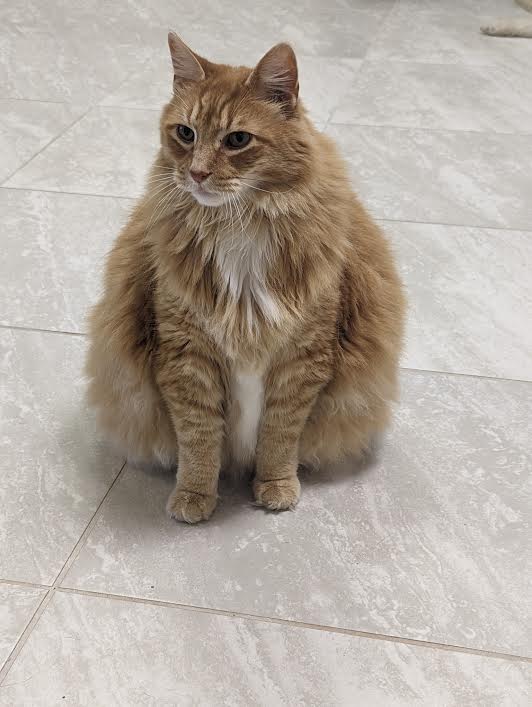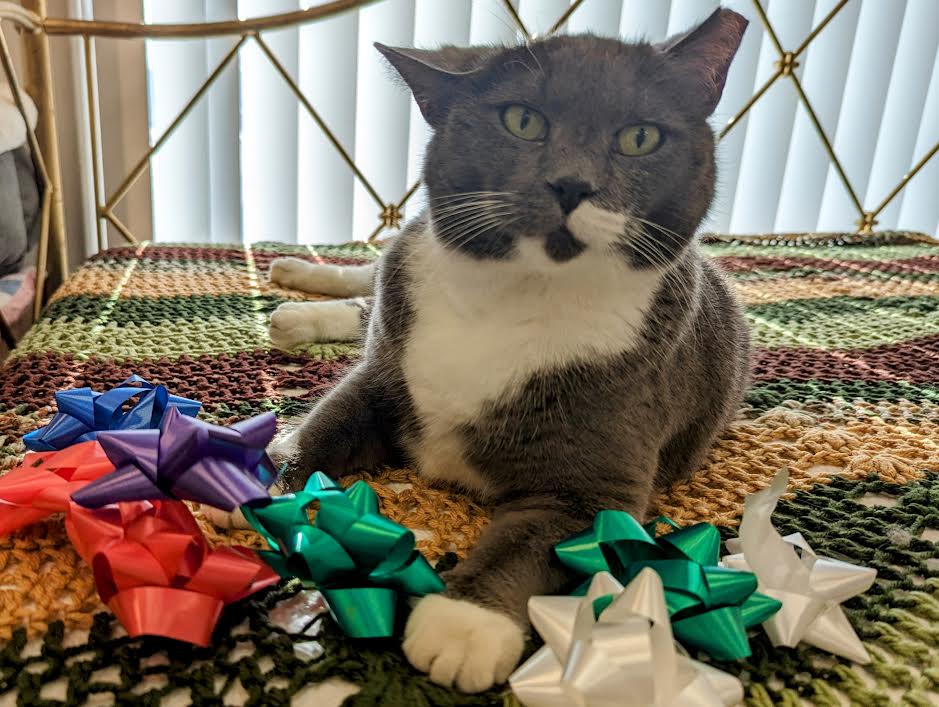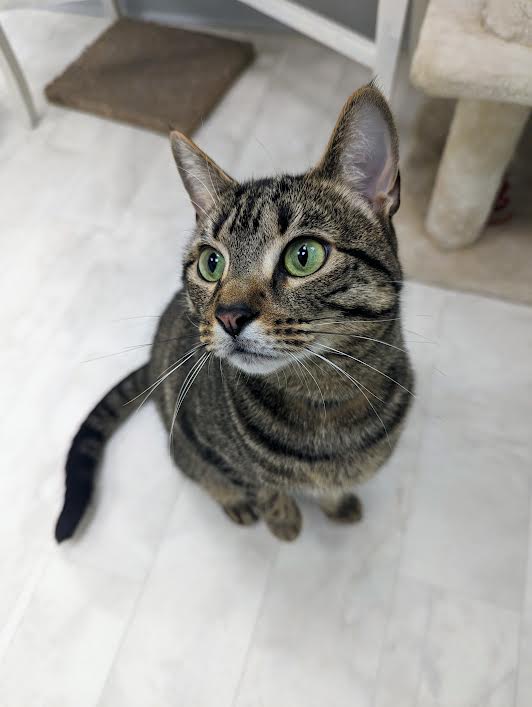|
Happy 2024! New Year’s resolutions are fresh on our minds, and on many lists there may be a goal to lose weight and exercise more. Our feline friends can also suffer from weight gain, and carrying only a few extra pounds can really affect them. Since cats are dependent on us for their food and activity levels, we become responsible for maintaining their healthy weight.
A note: preventing weight gain in your cat is easier than working to take off the weight. Maintaining a balanced, healthy diet, portion control, and exercise is all easier said than done, but being aware of your cat’s health, and the factors involved in their weight should be top of mind. Is Your Cat Gaining Weight? My sweet Daphne is an indoor/outdoor lady, and come winter time, if it is below 50 degrees, she stays inside all warm and cozy. Unfortunately, here in Syracuse, winter can last months, meaning she may not be out prowling from November until March. Her “winter layer” really starts to show after six weeks of sitting indoors, and her stomach and hips go from concave to bulging. I can also tell she is gaining weight because her belly starts to droop lower below her. Once temperatures start to rise, and she is ready to head back out, within weeks her weight starts to drop and she is back to her usual size. Looking down at your cat from above is an easy way to tell if their hips and stomach have expanded and rounded. Or, you can simply put them on a scale. How Much is Too Much? We also have to consider that Daphne, like many cats, is a big cat: she is tall and long, so any extra weight is evenly distributed, and she is still healthy. Knowing your cat’s body type is a key part of managing realistic expectations, and knowing if weight loss or weight gain is necessary, achievable and sustainable. Why is Weight Gain a Big Deal? Excess weight gain in cats significantly impacts their health and life expectancy. As with humans, extra weight can contribute to serious health conditions such as diabetes, heart disease, arthritis, and bowel and urinary complications. Grooming can also really be affected also when your cat is too large to bend and reach, which can contribute to a number of coat issues like excessive dander and mats. Grooming is essential to the well being of a cat, and not being able to do so can impact their physical and mental health. My Cat is Overweight; What Do I Do? Talk to your veterinarian and come up with a weight-loss plan. Your vet can discuss any health risks you and your cat should be worried about. It’s important to remember that rapid weight loss can be very detrimental to the health of your cat, so slow and steady is the best approach to getting their health back, using a combination of diet and exercise. Suggestions to add to your daily routine to help get your feline lean and healthy can include:
Eating right and staying active is a process, but is a lifestyle that should include your animals as well. You want your fur babies around as long as possible, and fewer health issues and vet visits equal a happier you and a happier cat. Let’s do our best to keep these health-conscious New Year’s resolutions! (Today’s photo features our big, fluffy friend Mr. Bing!)
0 Comments
Each Christmas, my mom used to get my cat a stocking, and fill it full of little gifts for her to play with and snacks to eat. It was always the least expensive, most simple items that would keep my kitty busy. In a time when our options are limitless, here are some great gift ideas for your furry feline this holiday season.
Cat Bed My cat Daphne likes to snooze in a window while snuggled into a comfy cat bed that I got for her years ago. The bed has seen better days, and there are many new styles to consider now. There are rectangular beds, round high-sided beds, covered beds, and deep beds for them to sink into. You can also choose fluffy beds or memory foam beds, or a bed that attaches to a window! (Memory foam in particular is good if your animal has arthritis because it will help relieve pressure from their joints). Whatever style you think is best for you feline friend, we are sure they will love and appreciate it! Hint: Check the dog aisle! There are several styles for small dogs that would fit your kitty purrfectly. Food & Water Dishes Most automatic feeders are reasonably priced, and very handy if portion control is a concern for your indoor cat. You can find some with cameras on them, too, so you’re able to watch kitty dine while you’re away from home. Slow feeders are another good choice if your cat likes to scarf their meals! Or, a new set of bowls works just as well, but remember to consider a wide opening because some cats have whisker sensitivity. My mom bought Daphne an adorable crystal bowl years ago, and she loves eating out of it. Hint: The dog aisle has some larger bowls which are good for free feeding, or multi-cat households. Snacks & Treats Speaking of food; options are endless for treats! We see a wide variety of treats from Cat Spa guests. From store-bought brands to gourmet dried minnows, your cat can have a delicious snack without spoiling meal time. Stop by the treat section sometime, and get a variety for them to try. You may be surprised at what your cat really fancies. Cat Tree The selection of cat trees ranges from small and simple to super tall, multi levels with hammocks and scratch pads. Online retailers have some great fun styles, and so do several discount stores. We’ve seen some that are hard surface, which makes cleaning a breeze, and some with plush carpeting that gives kitty the ultimate comfort. Remember that not every cat is a fan of cat trees, so consider your cats’ jumping and climbing style, as well as their age and activity levels before purchasing. Scratchers We all know cats love to scratch! A great way to keep them from clawing furniture and flooring, while keeping them happy and healthy, is to treat them to a new scratcher. All cats have different preferences, so watch to see how your cat likes to scratch. Some like to stretch upwards, which means a tall, sisal scratching post would likely be a favorite. Other cats like to stretch forward on the ground, so a flat scratcher would be best. One of our cats is really tricky, and only wants to claw carpet, so a flat, carpeted-base scratcher is her go-to. Toys There are so many toy options! You can choose an interactive toy for independent play, or toys that they need your time and attention to use. Battery operated options like spinning feathers, or activity sets are great for energetic and intelligent cats. Most cats have a favorite toy, so try a few first! For example, try a small, inexpensive laser pointer first before investing in a larger laser spinning tower. At the end of the day, the most simple string toys or toy mice can entertain the wildest of cats for longer than you can dream of. (And they will almost always prefer to play with their humans than alone). Your pets are family too, so getting them a cute stocking stuffer or gift is a fun way of including them in the holiday season. There are a wide range of options and price points to choose from, so sky’s the limit for cat gifting! Happy Holidays to you and your feline friends! (Today’s photo features our festive friend Luna!) What is a Domestic Shorthair?
When a new customer calls to board their kitty here at Rock The Cat Spa, we ask a number of questions to ensure a good fit for both the customer and for us. One of those questions is about the breed of their cat, but I can’t tell you how many times a customer says, ”Ummm, he/she’s a generic cat?” I immediately know that they have a Domestic Shorthair (DSH for short) or American Shorthair. (More on the American shorthair later on). Let’s learn more about this very common house cat! A Range of Personality With dogs, we hear the term “mutt,” and this could really be used for a Domestic Shorthair, because these cats don’t belong to one specific breed. Like a “mutt”, they are a mix of many different breeds. Because of this breed mix, their personalities, growth, coat, and medical needs can vary widely. It is always best to get to know your potential kitty before adopting one, but even more important with these variations in DSH. We have seen the entire spectrum of personality traits in Shorthairs: they can be timid and shy, friendly and playful, or aggressive and intimidating. Take these possibilities into consideration when adopting your DSH into a home with any children, older family members, or other pets. While they’re a wonderful breed, and we love having them, make sure you pick a personality that is right for your needs. Short Fur Coats Domestic Shorthairs have a wide variety of eye colors and coat colors, but in any color or pattern, their short, soft coats are low maintenance, and they require very little grooming. This breed is a great option for owners who don’t have time to brush their furry friend every day. If you can manage a quick brushing a couple of times a week, a DSH is perfect. Since the short coat is easy to handle, they don’t shed a lot, however all cats have dander, which can contribute to allergies. Happy, Healthy Cats Domestic Shorthairs typically have a smaller frame, and weight between 6-12 lbs on average. Of course, as with any cat, they can overeat and become overweight easily. While extra weight can cause health issues, Domestic Shorthairs can be a very healthy, and long lived cat. Some live up to 20 years! These kitties will bring you years of happiness and fun memories, so consider adopting one if you are looking for a good, short haired cat! (Today's photo features our bright-eyed friend Honey Bee!) |
AuthorWhen Cari has some free time from all the kitties, she likes to share her knowledge of all things cat in this bi-monthly blog. Enjoy the read! Archives
June 2024
Categories |




 RSS Feed
RSS Feed